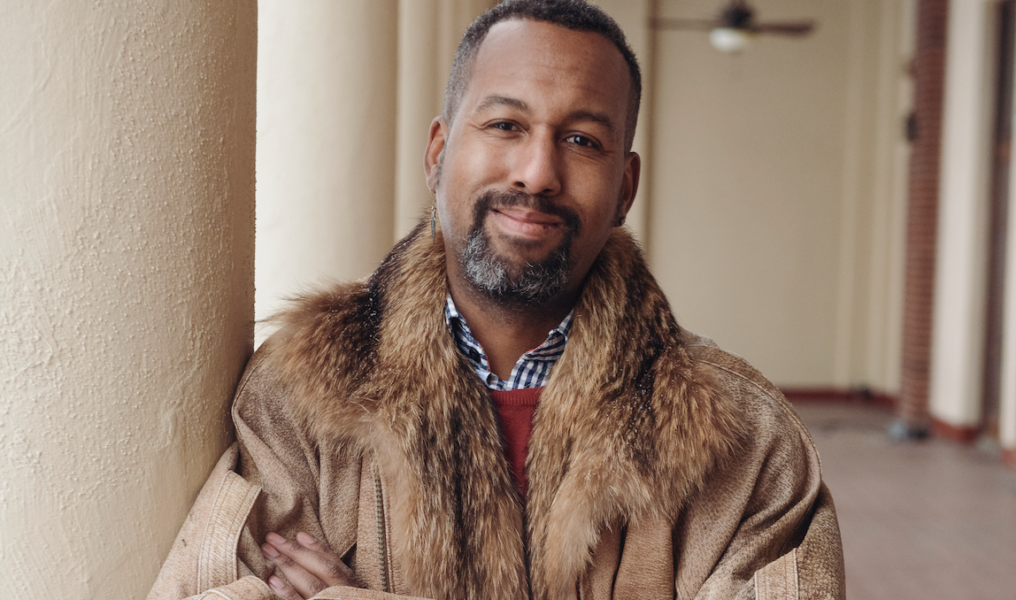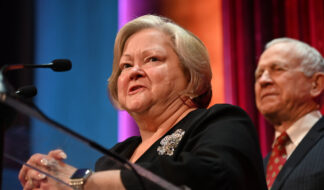For many Americans, 2021 likely feels like a welcome political reset as the nation starts to settle in to the next four years under the Biden/Harris Administration. For the LGBTQ+ community, even in the short month that new leadership has been in office, actions like the transgender military ban reversal and promises to pass LGBTQ rights legislation within Biden's first 100 days in office make clear that presidential priorities have shifted toward inclusivity.
While the results of the election may have seemed like a one-time struggle, it is due to the work of activists like Roland Leggett over months and years that made the change possible. Leggett, who served as the Biden campaign's regional political director in Michigan, was reelected this week to serve another two-years as the chair for the Michigan Democratic Party's LGBT&A Caucus. For him, "now is the time to get the work done." He caught up with Between The Lines via phone to outline the next steps to ensure a successful term and talk more about what inspired him to join the Caucus.
"We're exiting a very difficult part of American history when it comes to our community in particular. … We have to make sure that we're not placed in that position again," Leggett said. "[We're] holding the folks that we got elected accountable to make sure that we're getting the things that the folks in our community need."
"We Came Very Close"
Alongside Leggett, Grace Wojcik, Jacob Johnson, Emme Zanotti and Susan Grettenberger were all voted in by registered Michigan Democratic Party members to serve as the Caucus's first, second, third and fourth vice chairs respectively. Leggett said that in 2021, the caucus will prioritize the needs of the transgender community first.
"We're focused on the needs of the transgender community in particular as a result of our trans brothers and sisters being statistically far more likely to succumb to homelessness or violence," he said. "The murder rate for transgender women of color in Detroit is the highest in the country, and we're going to continue to push the candidates that won our support based on those policies that best help address what I was just describing."
Work with families and supporting pro-LGBTQ candidates is a must as well, and Leggett is excited for an upcoming roundtable meeting that is in the works. There, LGBTQ+ people from around the state will have the opportunity to engage with LGBTQ+ and allied leaders to discuss where they can best allocate their resources to best serve the population.
Finally, within 2021, the Caucus has plans to "tweak" a few things internally within its own structure.
"There's a conversation that we have every few years about whether or not the name of the Caucus reflects the diversity of our community. We don't want to send a false message that there are folks in our community that aren't included," Leggett said. "… We're also going to be taking a look at our bylaws to ensure that the language reflects the inclusivity that I was talking about. And also, the bylaws are several years old and we want to take a look at what other caucuses around the country have on the books to ensure that they're addressing the needs of the Caucus members."
Perhaps most importantly, however, the Caucus's work will center around ensuring that there is political accountability in elected and running officials in Michigan. Due to the state's progressive, LGBTQ+-supportive leadership like Attorney General Dana Nessel, Gov. Gretchen Whitmer and Oakland County Executive Dave Coulter, Leggett remains optimistic that the Caucus is uniquely positioned to do so.
"In 2019, the idea of having an openly gay Oakland County executive seemed like that was very far away, so I'm really excited to see how we could partner with him to make sure that the policies and the focus that he's interested in implementing in Oakland County reflect the needs of our community. And that's something that we couldn't say for decades," he said. "Let's now remember where we just came from and how fragile this is and how easily we can lose the ground we've made. I would just encourage folks to remember that February 2021 feels much better February 2020 did, but remember that we came very close."
Leggett then gave an example of how the public can rely on the Caucus to hold even pro-LGBTQ+ politicians to their word, like when Sen. Debbie Stabenow asked the Caucus to hold a fundraiser.
"I said sure if the senator would take a tour of the Ruth Ellis Center and sit down with senior staff to have a conversation about the needs of the organization. She agreed to do that and it was great. That was a great example of accountability," Leggett said. "… [We need to make] sure that they know that we are a robust organized presence … so that when crucial votes are happening they not only know that we are watching but that we have the ability to shine a bright light on what they're doing."
A History of Politics
And with a 20-year history in social justice and political activism, Leggett has a better understanding than most of the LGBTQ+ community's ability to organize. Originally from Metro Detroit's suburbs, Leggett grew up in a family that prioritized volunteering and service. But it was because of his time at the Affirmations' LGBTQ+ center's youth program in the mid-'90s that he began to think of politics as a viable career.
"There was an organizer there named Sean Kosofsky, who eventually became the political director of Equality Michigan and now does work around the country, but when I was a teenager, he ran the youth program," Leggett said. "He would train us on organizing other folks in our community."
Leggett was given the resources to help fellow LGBTQ+ youth attend the center, and eventually, that translated into his first paid position as an organizer at the American Civil Liberties Union. When asked why he didn't run to be an LGBT&A Caucus member sooner than 2017, Leggett said that it didn't feel like an option until he got older.
"One of the things that I've really appreciated and that I've noticed over the last few decades is the diversity of the folks that are making decisions about how to move forward as a community — that's a great change," he said. "And, frankly, we're just far more resourced than we were before."
In addition, he said that since the '90s he's been pleased to see more buy-in to the legitimacy of the LGBTQ+ community as a political entity. He used Pride events as an example, where corporate advertising there once seemed "revolutionary."
"It moved from a few companies doing that and that being considered a big deal to now we're demanding that company's support candidates that support us. And if they don't, our organizing power has become so dynamic that they know we can boycott them and it affects their bottom line, which is what companies care about," he said. "So you're seeing the political pressure that our community, and others, can put on companies in such a way so that it's not just about making a donation and having a banner at a Pride."
To keep that forward momentum going, as LGBT&A Chair, Leggett is keeping his foot firmly on the gas.
To learn more about Leggett, the LGBT&A Caucus and its upcoming events visit facebook.com/TheLGBTACaucusoftheMDP/.










